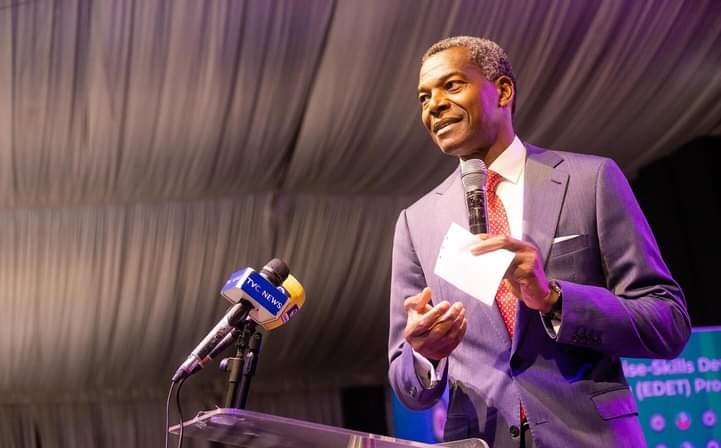Via – PUNCH
Deputy National Organising Secretary of the All Progressives Congress, Nze Chidi Duru, discusses the economic challenges facing Nigeria, President Bola Tinubu’s reforms, and the political crises in Kano and Rivers states with ADEBAYO FOLORUNSHO-FRANCIS.
How do you assess President Bola Tinubu’s government after one year, given the legal challenges he faced following his election victory and the current economic hardships?
These are indeed challenging times. The legal challenges post-election are expected in Nigeria’s political landscape. Opposition parties often seek legal recourse after losing elections, whether at the local, state, or federal level. This is a standard part of our electoral process.
Regarding the economy, our party acknowledges the current hardships. When President Tinubu took office, he urged Nigerians not to pity him but to support his leadership. He knew the challenges ahead and committed to providing leadership to steer Nigeria through these tough times. The past year has been a learning curve, but we hope that the foundation laid will yield positive results in the coming years, addressing the immediate needs of Nigerians such as food, shelter, and security.
Many believe that Nigerians are running out of patience. How much longer will they have to wait for the promised dividends of democracy?
Both as a Nigerian citizen and a party member, I recognize the economic difficulties and the urgent need for solutions. There is hunger and hardship, and these issues are undeniable. The government’s comfort zone has ended, and it’s time for us to be held accountable. The next steps involve addressing these challenges head-on, meeting the aspirations of Nigerians, and ensuring that their basic needs are met. This is crucial for the party’s future and for earning the trust and support of the electorate.
The opposition seems to be taking advantage of the ongoing reforms by Mr. President. Are you concerned that these reforms might be counterproductive?
It’s natural for the opposition to highlight our weaknesses and downplay our strengths. This dynamic keeps us accountable and vigilant. A strong opposition is essential for a healthy democracy as it ensures that the government remains responsive to the people’s needs. The criticisms from the opposition help us identify areas for improvement and reinforce our commitment to delivering on our promises.
What is your stance on the rumored merger or alliance between major opposition parties like the Peoples Democratic Party and Labour Party?
I personally advocate for a two-party system in Nigeria. The current multiplicity of parties complicates the political landscape and makes it harder for the electorate to hold parties accountable to their manifestos. A merger or alliance of major opposition parties would create a clearer political dichotomy and enhance democratic engagement. It would also push our party, the APC, to remain competitive and address the needs of Nigerians effectively to avoid losing future elections.
The last three months have been turbulent for APC National Chairman Dr. Abdullahi Ganduje, with attempts to remove him from office. How are you addressing the North Central stakeholders’ agitation?
I don’t speak for the North Central stakeholders, but I know that the APC has made strategic decisions regarding leadership positions. The national chairman’s role was moved to the North-West, leading to Dr. Ganduje’s election. In political contexts, disagreements and contestations are expected. As long as these are handled within the law, they are part of the democratic process. Changes in party leadership, if needed, should follow the proper procedures as outlined in our party constitution.
There are concerns that the APC might lose Kano State again in 2027 due to the Rabiu Kwankwaso and Ganduje feud. Why is it challenging for the President to reconcile these former allies?
The APC respects the rule of law and the decisions of the Supreme Court. We have accepted the NNPP’s control of Kano State and are committed to supporting all states irrespective of the ruling party. The President’s role is to ensure good governance for all Nigerians, not to engage in inter-party conflicts. It is up to the stakeholders in Kano State to prioritize governance and the welfare of their citizens over political disagreements. Reconciliation efforts should focus on this larger goal.
What are your concerns regarding the 25 lawmakers involved in the ongoing crisis in Rivers State?
The law is clear on the movement of lawmakers from one party to another. The courts have established precedents, and we expect all involved to respect legal rulings. The APC is committed to upholding the rule of law and will abide by the court’s decisions. We are confident in the integrity of the judicial process and believe it will resolve this issue appropriately.
Given the economic hardships, are you optimistic that Nigerians will accept another Tinubu presidency in 2027?
In politics, four years is a significant period. From the start of their term, politicians are evaluated by the electorate. President Tinubu, if he chooses to run, would likely be the APC candidate due to the incumbency factor. Our focus must be on ensuring that the government’s policies meet the needs of Nigerians, creating employment, and improving living standards. If we achieve this, we will be well-positioned for re-election in 2027.
This interview was conducted by Nze Chidi Duru with The Punch newspaper, with minor edits and adaptations by The Spectacles for clarity and readability.
